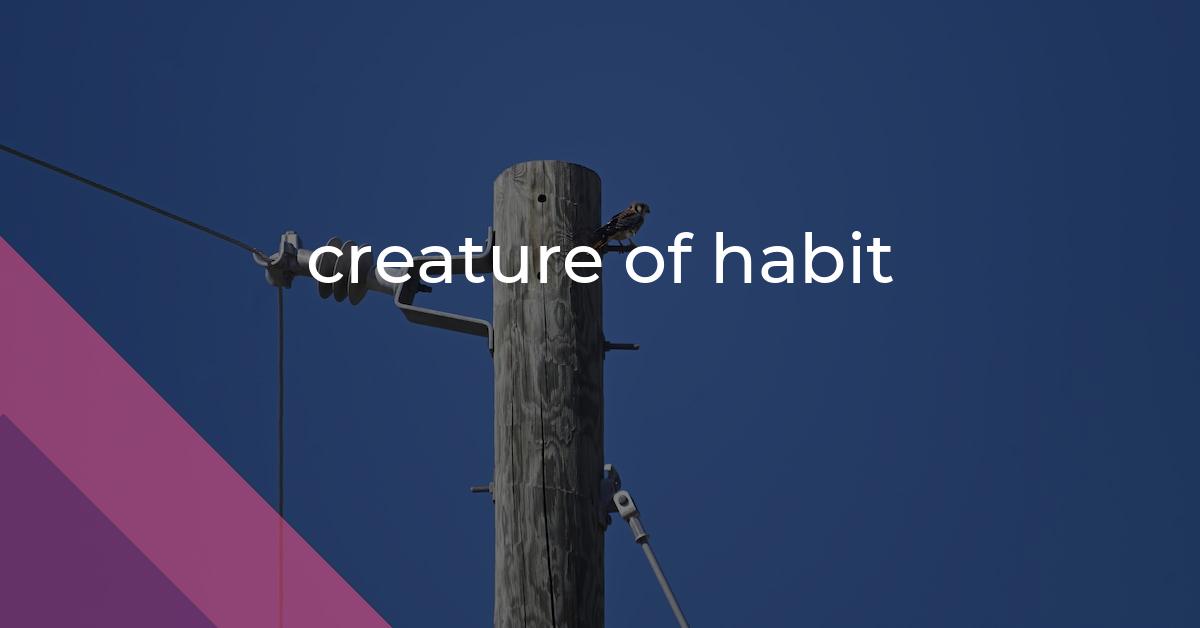creature of habit: Idiom Meaning and Origin
What does ‘creature of habit’ mean?
The idiom *creature of habit* refers to a person who consistently follows the same routines or behaviors, often without considering alternatives. They are resistant to change and prefer the comfort and familiarity of their established habits.

Idiom Explorer
The idiom "Joe Citizen" refers to an average person, an ordinary individual who represents the typical member of society. It is often used to emphasize the relatability or universality of a situation or concept.
The idiom "in character" means acting or behaving in a way that is consistent with one's typical behavior or personality.
This idiom means to adapt to a situation or circumstance without resisting or trying to control it. It implies going along with whatever is happening and not trying to change or fight against it.
The idiom "go native" means to adopt the customs, behaviors, or lifestyle of the local people in a foreign place, usually to an excessive extent. It often implies a loss of one's own cultural identity.
The idiom "glutton for punishment" refers to a person who willingly and repeatedly subjects themselves to difficult or unpleasant situations, suggesting a lack of self-preservation or a masochistic tendency.
The idiom "force of habit" refers to the tendency to do something out of habit, even if it may not be the best or most logical choice in a given situation.
The idiom "day in, day out" means consistently or without interruption, typically referring to a repetitive or monotonous daily routine or task.
The idiom *day after day* refers to the repetition or continuity of an event or action on a daily basis, without any significant change or variation.
The idiom "daily grind" refers to the everyday routine or monotonous tasks of one's job or life.
Habitual Curiosity
The idiom "creature of habit" is commonly used to describe individuals who have a strong tendency to follow a particular pattern of behavior or routine. It refers to those who are resistant to change and prefer the familiar. It emphasizes the idea that these individuals are creatures driven by instinctive or ingrained behavior patterns. Their habits become deeply rooted, becoming a defining characteristic of their personality.
One important aspect of this idiom is the use of the word "creature" to describe a person. It is meant metaphorically, highlighting the idea that individuals who are creatures of habit are driven by instinctive or ingrained behavior patterns. It implies that their habits are deeply rooted, forming a defining characteristic of their personality.
Furthermore, the term "habit" specifically refers to a repetitive, routine behavior. It emphasizes the regularity and predictability of the actions taken by the person in question. These habits often become deeply ingrained over time, forming a sort of comfort zone for individuals who resist change or crave stability.
The idiom "creature of habit" is most commonly used to describe individuals who resist or are reluctant to step out of their established routines. It suggests that these individuals may feel uncomfortable or unsettled when faced with new or unfamiliar situations. They exhibit a strong preference for consistency and predictability, finding solace in the familiarity of their habits.
While being a creature of habit can provide a sense of security and stability, it can also limit an individual's willingness to embrace new experiences or adapt to change. This idiom often conveys a subtle cautionary message, suggesting that individuals who are overly attached to their routines may miss out on opportunities for growth and personal development.
It is important to note that being a creature of habit is not inherently negative. Many successful individuals, such as artists, writers, and scientists, have attributed their achievements to the discipline of their daily routines. However, there is a fine line between beneficial habits and stifling rigidity.
The idiom "force of habit" can be related to the concept of being a creature of habit. It refers to the strong influence that habits can have on a person's behavior. When something becomes a habit, it is often difficult to break away from it. The idiom suggests that habits can be powerful and have a forceful impact on individuals.
The idiom "as ever" can also be related to the notion of being a creature of habit. It emphasizes the consistent and unchanging nature of a person's behavior or habits. It suggests that the person's habits remain the same over time, reflecting their deeply ingrained nature.
The idiom "creature comfort" refers to things or conditions that provide comfort and satisfaction to a person. It can be related to the idea of being a creature of habit in that individuals who have established routines often find comfort and satisfaction in the familiarity of their habits. These habits become their "creature comforts," providing a sense of security and stability.
The idiom "creature of the night" is unrelated to the concept of being a creature of habit. It refers to someone who is active or primarily operates during the nighttime, often associated with nocturnal animals or individuals who prefer nighttime activities.
The idiom "bred-in-the-bone" can be related to the idea of being a creature of habit. It suggests that certain characteristics or habits are ingrained or deeply rooted in a person's nature. It emphasizes that being a creature of habit is not simply a choice, but rather a fundamental aspect of who a person is.
Example usage
Examples of how the idiom creature of habit can be used in a sentence:
- My grandfather is a creature of habit and always goes for a walk every morning before breakfast.
- She's a creature of habit and never goes to bed without reading a few pages of a book.
- Despite moving to a new city, he remains a creature of habit and still visits the same coffee shop every day.
More "Behavior" idioms



